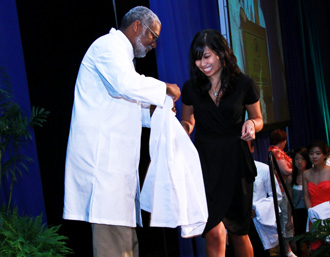Record Class Dons White Coats
Tulane University School of Medicine welcomed the class of 2014 at its annual White Coat Ceremony in the Grand Ballroom at the Hilton Riverside Hotel on Monday (Aug. 2). As family members and friends looked on, a record 188 new medical students crossed the stage to receive their first white coats.

Crystal Le of Kenner, La., one of the 188 incoming first-year medical students at the Tulane School of Medicine, receives her white coat from Dr. Earnest J. Sneed, assistant dean of student affairs. Le received her undergraduate degree from Tulane University. (Photo by Guillermo Cabrera-Rojo)
“The White Coat Ceremony is the first year medical student's introduction to the medical profession,” said Dr. Marc Kahn, senior associate dean of admissions and student affairs. “This event recognizes the compassion that is essential to becoming a good physician. Wearing a white coat does not assert privilege. Rather, it implies responsibility. When the first-year students put on the white coat, they have a huge responsibility to uphold the honor and tradition of the medical profession.”
Dr. Earnest J. Sneed, assistant dean of student affairs, placed a coat on the shoulders of each student. Each also received a badge embroidered with the seal of the medical school to be worn on the coat, a pin from the Arnold P. Gold Foundation for Humanism in Medicine and their first stethoscopes, a gift to each from the Tulane Medical Alumni Association.
This year's incoming class was chosen from among 10,038 students applying to attend, an increase from last year's record of 9,431 applications. More than 90 colleges and universities are represented in this year's class, including 23 graduates of Tulane University.
Dr. Eugene Berry, president of the Tulane Medical Alumni Association and a 1964 alumnus, delivered the Dr. Wallace K. Tomlinson Lecture. Observing that the medical profession is undergoing many changes, Berry urged the students to make creative use of their opportunity.
“You are in the enviable position to be entering medicine at a time when you may be able to help restructure and improve the way we care for our patients,” he said.
